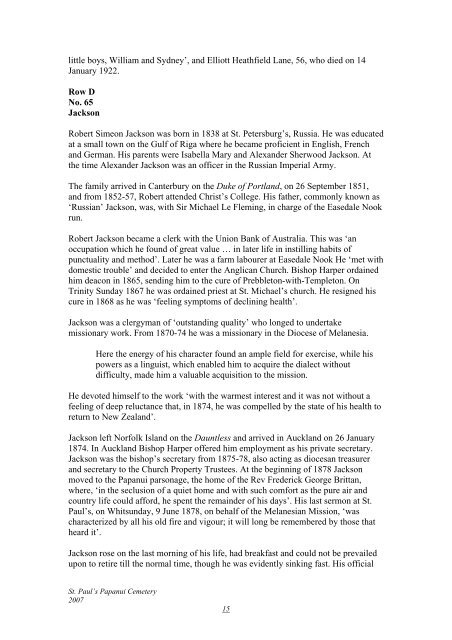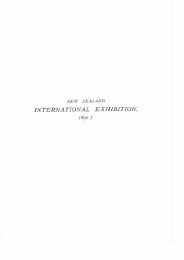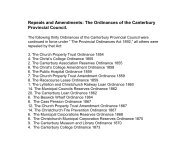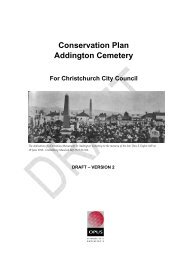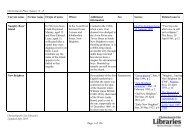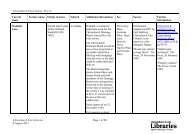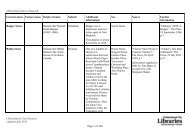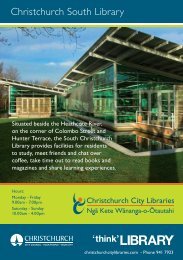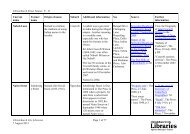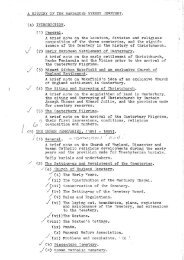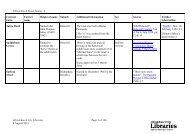St Pauls Papanui Cemetery - Christchurch City Libraries
St Pauls Papanui Cemetery - Christchurch City Libraries
St Pauls Papanui Cemetery - Christchurch City Libraries
Create successful ePaper yourself
Turn your PDF publications into a flip-book with our unique Google optimized e-Paper software.
little boys, William and Sydney’, and Elliott Heathfield Lane, 56, who died on 14<br />
January 1922.<br />
Row D<br />
No. 65<br />
Jackson<br />
Robert Simeon Jackson was born in 1838 at <strong>St</strong>. Petersburg’s, Russia. He was educated<br />
at a small town on the Gulf of Riga where he became proficient in English, French<br />
and German. His parents were Isabella Mary and Alexander Sherwood Jackson. At<br />
the time Alexander Jackson was an officer in the Russian Imperial Army.<br />
The family arrived in Canterbury on the Duke of Portland, on 26 September 1851,<br />
and from 1852-57, Robert attended Christ’s College. His father, commonly known as<br />
‘Russian’ Jackson, was, with Sir Michael Le Fleming, in charge of the Easedale Nook<br />
run.<br />
Robert Jackson became a clerk with the Union Bank of Australia. This was ‘an<br />
occupation which he found of great value … in later life in instilling habits of<br />
punctuality and method’. Later he was a farm labourer at Easedale Nook He ‘met with<br />
domestic trouble’ and decided to enter the Anglican Church. Bishop Harper ordained<br />
him deacon in 1865, sending him to the cure of Prebbleton-with-Templeton. On<br />
Trinity Sunday 1867 he was ordained priest at <strong>St</strong>. Michael’s church. He resigned his<br />
cure in 1868 as he was ‘feeling symptoms of declining health’.<br />
Jackson was a clergyman of ‘outstanding quality’ who longed to undertake<br />
missionary work. From 1870-74 he was a missionary in the Diocese of Melanesia.<br />
Here the energy of his character found an ample field for exercise, while his<br />
powers as a linguist, which enabled him to acquire the dialect without<br />
difficulty, made him a valuable acquisition to the mission.<br />
He devoted himself to the work ‘with the warmest interest and it was not without a<br />
feeling of deep reluctance that, in 1874, he was compelled by the state of his health to<br />
return to New Zealand’.<br />
Jackson left Norfolk Island on the Dauntless and arrived in Auckland on 26 January<br />
1874. In Auckland Bishop Harper offered him employment as his private secretary.<br />
Jackson was the bishop’s secretary from 1875-78, also acting as diocesan treasurer<br />
and secretary to the Church Property Trustees. At the beginning of 1878 Jackson<br />
moved to the <strong>Papanui</strong> parsonage, the home of the Rev Frederick George Brittan,<br />
where, ‘in the seclusion of a quiet home and with such comfort as the pure air and<br />
country life could afford, he spent the remainder of his days’. His last sermon at <strong>St</strong>.<br />
Paul’s, on Whitsunday, 9 June 1878, on behalf of the Melanesian Mission, ‘was<br />
characterized by all his old fire and vigour; it will long be remembered by those that<br />
heard it’.<br />
Jackson rose on the last morning of his life, had breakfast and could not be prevailed<br />
upon to retire till the normal time, though he was evidently sinking fast. His official<br />
<strong>St</strong>. Paul’s <strong>Papanui</strong> <strong>Cemetery</strong><br />
2007<br />
15


